It was a tough year for Internet users in India and Kazakhstan.
The international organization Reporters Without Borders released its annual “Enemies of the Internet” list, and for a few countries, the results weren’t pretty.
Six countries saw their status on the list change from last year, and for four of them, it was a change for the worse. Here’s quick summary of the changes from the 2011 and 2012 reports.
RWB put two new countries on its list of nations “under surveillance.”
- India: More than any country this year, India has been criticized for implementing drastic (and often ineffective) measures to combat online piracy and content deemed politically or religiously offensive. “The national security policy of the world’s biggest democracy is undermining freedom of expression and the protection of Internet users’ personal data,” says the report.
- Kazakhstan: Though it “considers itself a regional model” when it comes to Internet freedom, Kazakhstan nevertheless blocked about twenty sites said to promote “terrorism and religious extremism” by a district court. One of those sites? The usually-harmless LiveJournal, which remains a very popular blogging platform in neighboring Russia.
Two nations went from being classified as “under surveillance” to “enemies of the Internet.
- Bahrain: A “perfect example of successful crackdowns,” Bahrain jailed several bloggers and forum admins for criticizing the government. One of them, Zakariya Rashid Hassan, died behind bars after being charged with “calling for the regime’s overthrow in online forums.”
- Belarus: After Belarusian Prosecutor General Grigory Vasilevitch announced he would “restore order” to the web, some users who tried to access a social media site where users were often critical of the government received a rude awakening. Their Internet Service Provider automatically redirected them “to sites containing malware.”
The future became a little brighter, however, for the two nations who dropped off RWB’s “under surveillance” list.
- Libya: Authoritarian ruler Muammar Gaddafi “had tried to impose a news blackout by cutting access to the Internet” before rebel forces killed him in October. However, RWB declares, “the overthrow of the Gaddafi regime has ended an era of censorship.”
- Venezuela: After being placed on the list in 2011 in fear of what RWB called an “Internet gag law,” those fears now seem to have largely been unfounded.
Photo by Pierre-Selim
